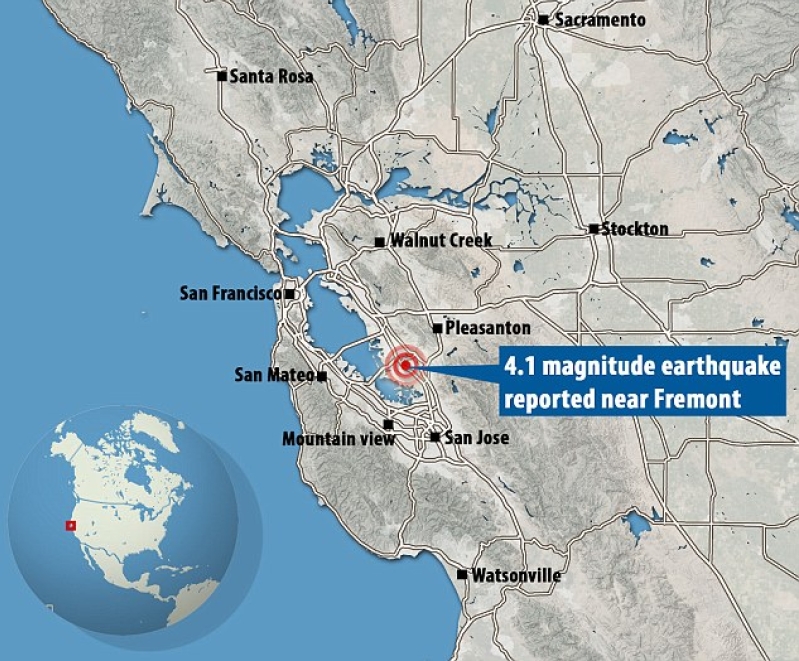
A moderate 4.1 magnitude quake shook the San Francisco bay area Tuesday morning but there was no report of injuries or damage to properties, authorities said.
The U.S. Geological Survey said the tremor struck around 2:30 a.m. at a depth of about seven miles. The center of the quake was traced one mile north of Fremont, some 35 miles southwest of San Francisco.
Seismologists at the USGS said two minor aftershocks, measuring magnitudes of 2.6 and 2.7 were recorded after the initial ground shaking. The aftershocks were also centered near Fremont and are believed to have originated from the Hayward fault line, which runs through the cities of Berkeley, Oakland, and Fremont. Data from the USGS showed that the last major tremor to have originated from the fault line occurred at about 7:53AM in October 1868.
The USGS describes the Hayward Fault, "The Hayward Fault runs from San Pablo Bay in the north to Fremont in the south, passing through the cities of Berkeley, Oakland, Hayward, and Fremont. South of Fremont the fault branches into a complex set of surface faults that connect the Hayward Fault to the central part of the Calaveras Fault. The Hayward and Calaveras Faults may have a simpler connection at depths more than 5 km (3 miles), joining in the subsurface just south of the Calaveras Reservoir (site of the October 30, 2007 M5.4 Alum Rock earthquake). The Hayward Fault may be segmented into a northern and southern segment in the vicinity of Berkeley or Oakland.
"The 2003 Working Group for California Earthquake Probability assigned a 27% probability that the Hayward-Rodgers Creek Fault system would produce a magnitude 6.7 or larger earthquake in the next 30 years."
Tuesday's quake comes after a magnitude 6.0 earthquake hit the region in August last year that killed one woman and injured hundreds, and caused an estimated $400 million in damages in Napa Valley.
Seven Things to do During and After an Earthquake
In any disasters, it is imperative that you keep calm so you can focus on the things you need to do to ensure your survival. Panicking will not help you as it will only cause confusion.
During an Earthquake
1. Take cover. Many injuries during an earthquake are caused by falling objects. Find a safe place to cover, including a desk or a table and stay under.
2. Stay insider if you are inside. If you are already inside the house of a building, stay there and stay safe. Avoid the temptation to run outside. Many people have been killed by falling debris from collapsing or falling objects by running outside.
3. If you are outside, take cover. When the ground starts shaking, find a safe place to cover. If there is no place to take cover, drop to the ground and cover your head and neck.
4. Stay in your car when you are driving. Your car will give you ample protection from falling debris. Your car may swerve with the shaking of the ground, so it is important to pull over to a safe area. Stay away from bridges and overpasses as they might collapse during a major tremor.
After an Earthquake
5. Check yourself for injuries. Immediately administer first aid to yourself, and if you are incapable, seek help from anybody nearby. After tending to yourself, check your surroundings if there are anybody who might need your help. Prioritize those that needed help badly, like children and the elderly.
6. Put on sturdy shoes, long pants, a long-sleeved shirt and work gloves for protection against broken glass and debris. If you're going to try to look for other people, be properly dressed and find a hard hat as well.
7. Go to your designated meeting area that you established during the pre-earthquake steps and use your radio for updates.







